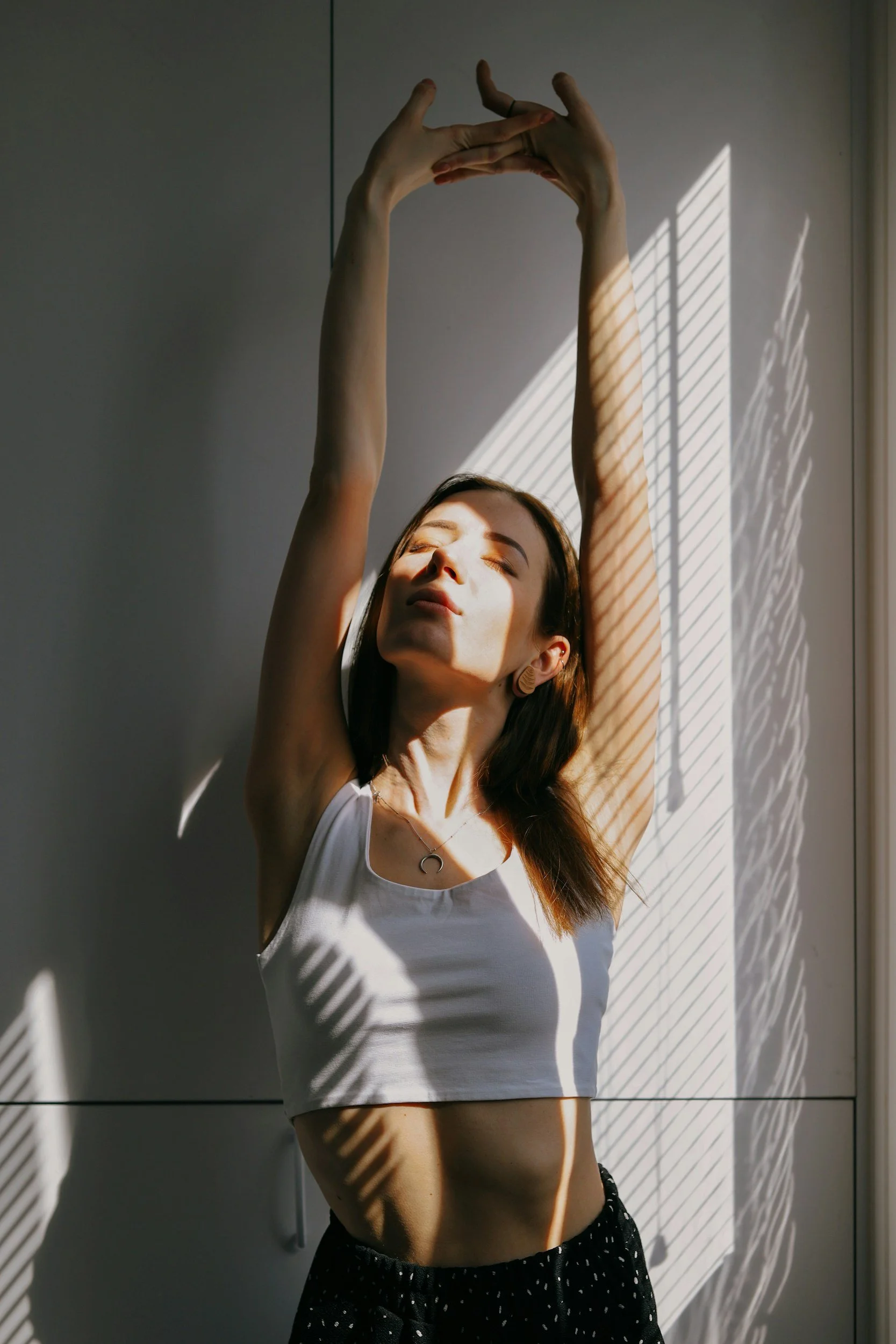Therapy & Sports Psychology for Women Athletes in Chicago
A warm, women-centered space to explore identity, performance, pressure, and well-being.
Schedule Your 1st Appointment
Meet Our Therapists for Women Athletes
What Is Sports Psychology (Through a Psychotherapy Lens)?
Sports psychology looks at the deep connection between your mind, your emotions, and your body — and how that connection affects your performance, confidence, and overall well-being. In psychotherapy for women athletes, we explore the thoughts, feelings, narratives, and physical responses that shape how you show up in your sport… and in the rest of your life.
For many women, this work becomes a space to:
understand the emotional weight of competition
explore identity outside of athletic achievement
reconnect with joy in movement
balance ambition with compassion
heal from internalized expectations around body, toughness, and success
It’s not about “fixing” your performance.
It’s about supporting you as a whole person — athlete, woman, human.
The Experience of Being a Woman in Sport
Being an athlete often means striving, pushing limits, working hard, and setting high expectations for yourself. For women, that experience can also include:
subtle or overt pressure to look a certain way
scrutiny, comparison, or fear of judgment
performance anxiety shaped by perfectionism
burnout from always giving more
recovering emotionally from injury or time away
navigating pregnancy, postpartum, or motherhood within sport
returning after physical or life transitions
Many women feel torn between their love of sport and the emotional weight it can carry. Sports psychology within psychotherapy offers a grounded, caring space to understand these pressures, build resilience, and feel more connected to your values, purpose, and whole self.
Common Areas of Focus for Women Athletes
-

Performance Anxiety & Perfectionism
Support for anxiety around competition, fear of underperforming, and the internal critic that makes sport feel heavier than it used to.
-

Injury Recovery & Fear of Re-Injury
Processing grief, frustration, identity shifts, and body trust after injury — including the emotional side of rehabilitation.
-

Body Image Concerns & Disordered Eating Patterns
Including experiences like comparison, pressure to maintain a certain physique, RED-S, or the female athlete triad.
-

Identity Beyond Sport
Exploring who you are when you’re not training or competing — or when life pulls your identity in new directions.
-

Transitions, Breaks, & Retirement
Navigating uncertainty, loss, or new meaning when a sport, season, or life phase comes to a close.
-

Relationship Stress in Athletic Environments
Managing dynamics with teammates, coaches, parents, partners, or anyone else connected to your athletic world.
-

Boundaries & Limits
Learning to say no, honor rest, and differentiate between healthy drive and harmful pressure.
-

Balancing Recovery & Ambition
Creating sustainable emotional rhythms that support high performance without sacrificing well-being.
Performance Anxiety for Athletes & Performers
Many women experience performance anxiety — not only in sport, but also in other performance-based worlds like dance, skating, or music. The pressure to be “on,” to get it perfect, or to meet others’ expectations can create stress that feels overwhelming or disconnecting.
At Balanced Awakening, several of our therapists have experience supporting women through these challenges. For example, Zana Van Der Smissen, LCPC previously led a group for teen ice skaters focused on performance anxiety and body image, and brings a warm, grounded approach to helping performers reconnect with a regulated, trusting mind–body experience.
Therapy can help you explore the emotions beneath performance pressure, rebuild confidence, strengthen your sense of self, and reconnect with your body in ways that feel supportive rather than demanding.
Pregnancy, Postpartum & Fertility for Women Athletes
Athletes often experience pregnancy, postpartum, and fertility considerations through a uniquely embodied lens — where identity, performance, and the emotional meaning of sport all intersect. Therapy offers a supportive space to move through these experiences with care and grounding.
Preparing for Pregnancy While Training or Competing
Exploring timing, career goals, physical changes, shifting identity, and the emotional nuances of this transition.
Fertility Uncertainty or Challenges
Processing the impact fertility journeys can have on your body image, sense of control, training choices, and emotional well-being.
Pregnancy as an Athlete
Navigating body changes, slowing down, adjusting routines, and managing pressure — internal or external — about maintaining performance.
Postpartum Emotional Recovery
Supporting mood changes, identity shifts, grief around performance changes, rebuilding trust with your body, and adjusting expectations gently.
Returning to Sport After Pregnancy
Honoring your timeline, your body’s wisdom, and your evolving identity while finding your way back to movement, competition, or training.
This work respects all parts of you — the athlete, the woman, the potential or current mother, and the human with a full emotional landscape.
How Therapy Helps Women Athletes
Sports psychology within psychotherapy is relational, grounding, and compassionate. It supports you emotionally, mentally, and holistically — not just as a performer, but as a full person.
Therapy can help you:
build self-awareness and emotional insight
understand and manage stress, pressure, and perfectionism
heal internalized expectations around performance or body
process transitions, injury, pregnancy, or identity shifts
cultivate resilience, confidence, and self-trust
redefine success in ways that support your full well-being
Many women discover a steadier, more empowered relationship with both their sport and themselves.
Why Balanced Awakening Is a Supportive Space for Women Athletes
Our practice is rooted in caring for the emotional lives of women — including identity development, bodily experiences, transitions, relationships, and self-worth. For athletes, this means you receive care that:
honors the mind–body connection
understands the intensity and vulnerability of competition
holds space for the emotional complexity of athletic identity
centers the unique pressures placed on women in sport
supports you gently through life changes and transitions
We blend evidence-based therapy with a warm, woman-centered approach where your whole self is welcome.
What to Expect in Therapy
Your therapeutic space is personalized and supportive. Sessions may include:
emotional processing
grounding and mind–body skills
reframing internal narratives
exploring identity and purpose
working through transitions
building self-compassion
learning sustainable mental-emotional rhythms
In-person sessions are available in Chicago, and virtual therapy is available throughout Illinois.
Women Athletes Therapy FAQs
-
Not at all. We work with women at every level — recreational, amateur, competitive, or returning to sport later in life.
If your sport is important to you (or used to be important), therapy can support you no matter your level. -
We focus on the emotional, psychological, and identity-related experiences that come with being a woman in sport.
This includes performance anxiety, body image, perfectionism, injury recovery, life transitions, pregnancy/postpartum concerns, and the unique pressures placed on female athletes.
It’s still talk therapy — just tailored to your lived experience as an athlete. -
Not exactly.
Sports psychology in a coaching context focuses on performance enhancement.
Psychotherapy focuses on you — your emotions, relationships, identity, pressures, and well-being.
It may help performance, but the goal is deeper: grounding, resilience, confidence, and a healthier mind–body relationship. -
Yes. Many athletes struggle emotionally after an injury — grief, frustration, fear, or feeling disconnected from their body.
Therapy helps with:navigating identity shifts
rebuilding trust in your body
managing anxiety around returning
coping with uncertainty
You don’t have to navigate the emotional side of injury alone.
-
Our therapy rate for the first two sessions is $250. After that, 55 minute sessions are $225.
Most of our therapists are in network with United Healthcare/Optum, BCBS PPO and Aetna insurance.
-
Absolutely.
We support women athletes through:fertility questions or challenges
preparing for pregnancy while training
pregnancy-related body changes
postpartum emotional recovery
returning to sport after birth
Your athletic identity and reproductive journey can coexist — therapy helps them feel less overwhelming.
-
Yes. Whether you’re:
taking a break
recovering
transitioning to a new sport
retiring
unsure of your next step
Therapy can help you process the emotions, uncertainty, and identity shifts that naturally come with stepping back from sport.
-
This is extremely common for women athletes, and therapy is a safe place to explore it gently.
We can work on:body trust
eating patterns and emotional triggers
separating your worth from performance or appearance
healing comparison or pressure from sport culture
You’re not alone, and nothing is “too complicated” to bring here.
-
It depends on your goals.
Some women come for short-term support around a transition or a specific challenge. Others choose longer-term therapy to deepen identity work, emotional resilience, or overall well-being.
We’ll collaborate on a plan that feels right for you. -
Yes — we support both teen and adult women athletes.
-
While therapy isn’t performance coaching, many athletes notice improvements in focus, confidence, and enjoyment once they feel more emotionally clear and grounded.
When your internal world feels calmer and more supported, your performance often follows naturally. -
No. You can start therapy simply because you’d like support — emotionally, mentally, or through a life or sport-related transition.
-
Yes. We offer virtual therapy throughout Illinois and in-person sessions at our Chicago office. Many athletes love the flexibility of online sessions, especially during busy training seasons.
-
Yes. We are familiar with the unique challenges women face in athletic environments — the expectations, the pressure, the perfectionism, the body demands, and the emotional intensity of competitive culture.
We’ll meet you where you are with warmth, understanding, and no judgment.
What Our Clients Are Saying
-
During our first session Hannah was proactive in creating a plan of action to properly diagnose me and address my concerns. Detailed. Office is beautiful. Love the decor, relaxing ambiance and free tea.
———
-
She was very kind and thorough during intake and the entire office looks like something out of a lifestyle magazine.
———
-
The office is lovely and welcoming, the in-take paperwork helped me prepare for what I wanted to talk about and gave me a starting point.
———
-
Dr. Yang is warm and empathic, and made me feel comfortable from the very beginning.
———
-
Emma has been very supportive through major life changes for me. Her sweet and gentle nature made it easy for me to feel safe to open up to her. I am very grateful for her support and kindness.
———
-
It was my first visit and she made me feel so safe. I opened up right away!
———
Ready to Begin?
You don’t have to be a professional athlete, injured, or “in crisis” to start therapy. If you’re a woman who loves your sport — or is questioning your relationship with it — this work can help you feel more grounded, supported, and connected.
Book an appointment when you’re ready.





